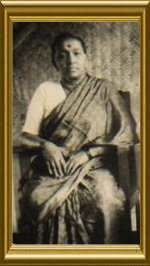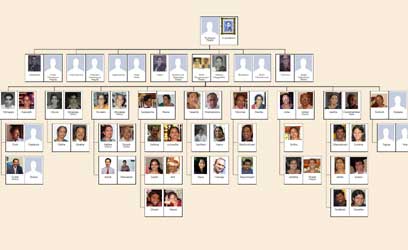Vorvady Akkaya Heggadthi
1903 - 1985
 When Durgalakshmi gave birth to a pretty little girl called Akkaya on February 23, 1903, little did she realise that this dear Big Sister (that’s what Akkaya means) would live to see most of the landmark developments of the twentieth century. She was witness to the glorious years of Vorvady House, the power, prestige, charm. On the downside, she was also witness to the tsunami that swept off the carpet from the feet of landowners of the State in the wake of the Land Reforms of 1966. She was one of those who lost a big share of her ancestral lands to the tenants.
When Durgalakshmi gave birth to a pretty little girl called Akkaya on February 23, 1903, little did she realise that this dear Big Sister (that’s what Akkaya means) would live to see most of the landmark developments of the twentieth century. She was witness to the glorious years of Vorvady House, the power, prestige, charm. On the downside, she was also witness to the tsunami that swept off the carpet from the feet of landowners of the State in the wake of the Land Reforms of 1966. She was one of those who lost a big share of her ancestral lands to the tenants.
Akkaya was never bitter nor was she jealous of her own tenants who became owners of land that was part of her estate. On the other hand, she was generous as ever. It was astonishing to see her tenants coming one by one to her seeking her advice on a vital question that haunted them at the time. Could they apply for ownership of the lands they were tilling according to the Land Reforms Act? “ Do it, by all means,” a compassionate Akkaya told her tenants. “I shall abide by the law of the land.”
Unlike many landowners of her time, Akkaya did not cajole her tenants to abstain from applying for land ownership. Nor did she use coercive means to retain her ancestral lands in her custody. Akkaya had always been in favour of the underdog. After all, she was the Big Sister to everybody in the large Vorvady Household. So was she to her tenants as well. They loved her immensely until the last day of her life.
Akkaya who was allotted joint ownership of Vorvady House under the Partition Deed of 1942 along with her elder sister Rajeevi (who had passed away in 1928) looked after the huge property as well as the management of the annual rituals of the House while Rajeevi’s children were growing up.
Akkaya married a graduate teacher from the noted Belle (Kattingeri) family. Her husband Belle Shamaraya Shetty became one of the most popular High School Headmasters of his time. He was a 1920 graduate and he did his teacher training from Saidapet Teachers College in Chennai. Of their nine children, four were sons and the rest daughters. Their eldest son Thimmappa chose to be a teacher and soon became an Education Officer.
Akkaya was in the evening of her life when the Land Reforms were implemented. She gave away her ancestral lands to her children in a Family Agreement drawn up in 1966. She was thus privy to the fragmentation of the once undivided mammoth Vorvady property.
The century-old Vorvady House was divided into two; the front portion was allotted to the heirs of Akkaya’s elder sister Rajeevi and the inner portion of the big House was bequeathed to Akkaya and her children. Like the Vorvady lands, the Vorvady House too came to be a divided house.
While division of property and the house was in accordance with the law of the land, Vorvady continues to be the focal point for the extended family. While annual rtuals like Kola, Kambla and Tambila are conducted by the branches of Rajeevi and Akkaya on a biennial basis, members of the extended family come together to the Vorvady House with great reverence to participate in the annual rituals.
Akkaya lived a full life and passed away peacefully at the ripe age of 82 years in 1985. She lived through the historical developments that took place in India including the transition from British rule to Independent India, the revolution of rising expectations of the middle class in free India, the landmark Hindu Code Bill that removed the anomalies of inheritance of family property by giving equal rights to the male and female heirs and the painful Land Reforms of the 1960s. She was generous to a fault, an endearing mother to everyone in the extended Vorvady family, and always affectionate, loving and supportive. She was dignified in her demeanor and mellow in her speech, a rare jewel of a beloved matriarch.
